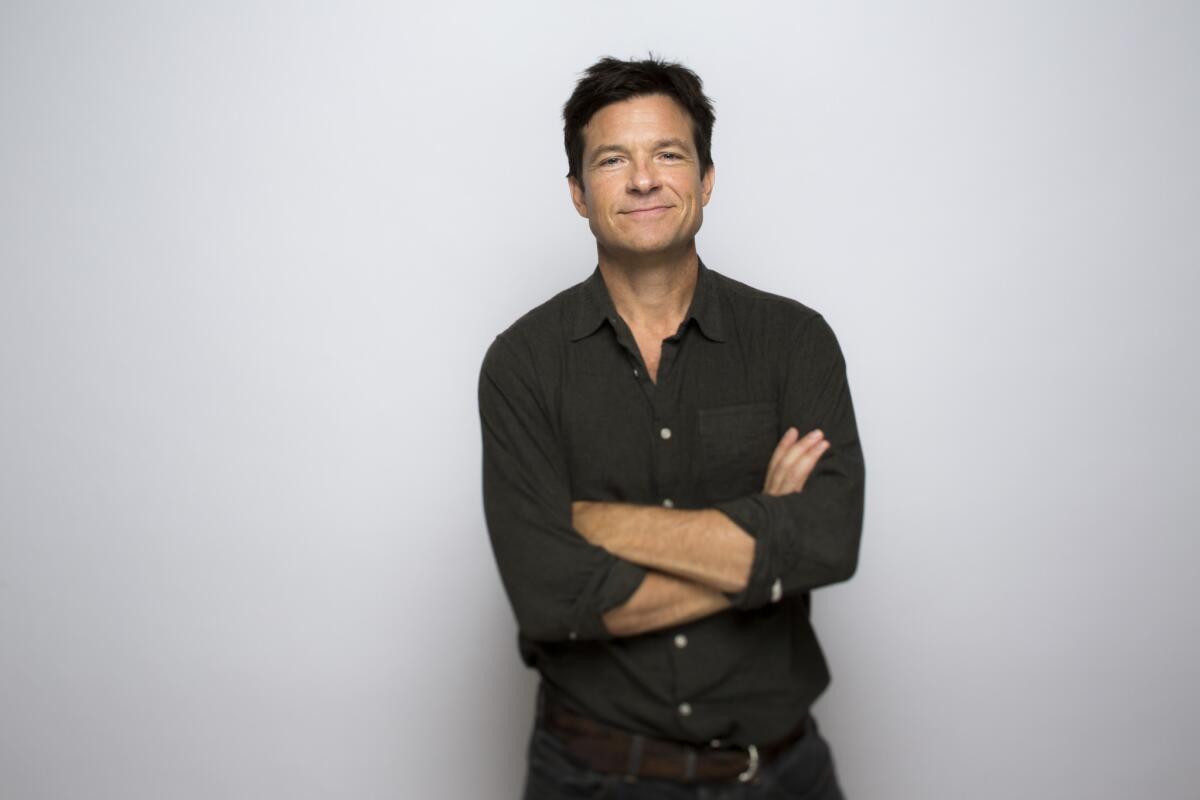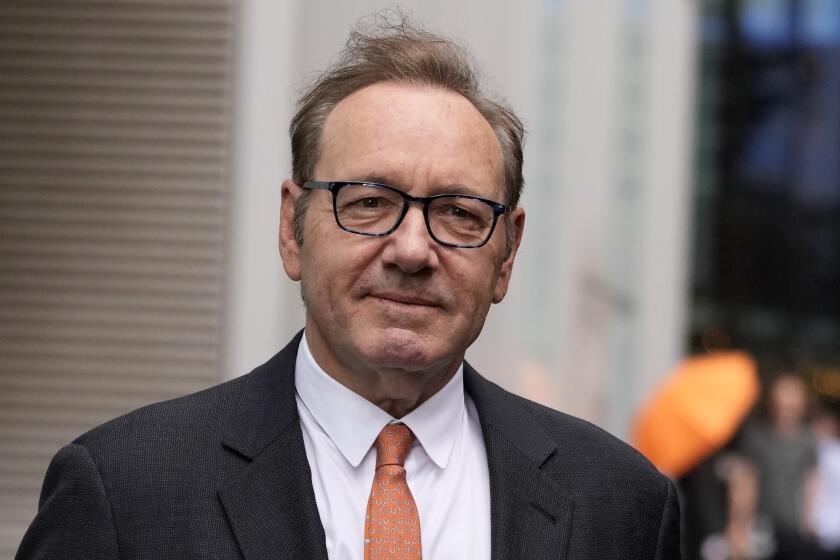Toronto Film Festival: Jason Bateman on childhood, adulthood and ‘The Family Fang’

Jason Bateman is photographed in the Los Angeles Times photo studio at the Toronto International Film Festival on Sept. 15.
Reporting from Toronto — ason Bateman has already navigated a few tricky transitions in his career with a low-key charm that has made it look far easier than it must have actually been. Once a child actor on such television shows as “Silver Spoons,” as an adult he reemerged as a deadpan everyman on TV’s “Arrested Development” and in films such as “Horrible Bosses.”
His first film as director was the very acerbic comedy “Bad Words,” in which he also starred. The film was picked up out of the Toronto International Film Festival in 2013.
Bateman was back in Toronto earlier this week with his second film as director, the tonally ambitious “The Family Fang,” an adaption of Kevin Wilson’s popular 2011 novel with a screenplay by Pulitzer Prize winner David Lindsay-Abaire and starring Nicole Kidman alongside Bateman as troubled siblings. The film is playing the festival looking for U.S. distribution.
FULL COVERAGE: Toronto, Telluride and more film festivals
Many notices for the book pinned it as a comedy with deeper emotional currents; the film recasts the story somewhat by emphasizing its darker, more dramatic heft.
In an interview here Tuesday, Bateman said he always saw the material as more dramatic than comedic.
“I never read the book in that way,” he said. “From the book, the subject matter and themes were always very dramatic and very human. I thought that Kevin was addressing something that was pretty emotional in a very entertaining way. So that was always the order that I saw things, a drama that had some moments of levity and comedy and eccentricity.”
Monday night’s world premiere screening was introduced by the festival’s director of programming, Kerri Craddock, who expressed particular enthusiasm for Bateman’s late-’80s/early-’90s sitcom “The Hogan Family” -- “I haven’t met a lot of ‘Hogan Family’ fans,” Bateman noted dryly when he came onstage.
Yet it was directing a few episodes of that show that got Bateman, now 46, into the Director’s Guild at the age of 18.
The story of his new film revolves around a family with the last name of Fang. The parents, Caleb and Camille (Christopher Walken and Maryann Plunkett), are performance artists of moderate reputation, best known for the way in which they used their children Annie and Baxter in their pieces, such as staging a bank robbery over lollipops or being purposefully terrible street musicians.
Annie (Kidman) and Baxter (Bateman) have subsequently struggled to find their own identities in adulthood. Annie is an actress of some notoriety, though as much for her public meltdowns as her performances, while Baxter is a struggling novelist and magazine journalist.
When Caleb and Camille disappear under mysterious circumstances, Annie and Baxter are suspicious that this is just another stunt, and they set about trying to discover the truth about their parents and find out some new truths about themselves.
It is perhaps not difficult to see what in that storyline of child performers moving forward with their adult lives may have spoken directly and deeply to Bateman.
“My upbringing as a child was very atypical,” Bateman said. “Started acting when I was 10, my parents being my manager, there’s a lot of overlap in this film from the way in which I was brought up. So this was something I certainly didn’t see as some kind of surface piece of entertainment.
“It’s something I had a full connection to and a deep understanding of,” he added, “and although I didn’t try to drag any of my own personal baggage into it, I certainly had a clear idea of what a version of this film might look and feel like if it were to represent children who had a nontraditional upbringing.”
The project began with Kidman, also a producer on the film, acquiring the rights to Wilson’s book. When Wilson declined to write the adaption himself, Lindsay-Abaire, who adapted his own “Rabbit Hole,” which Kidman starred in, was brought on. Bateman, as he says, raised his hand for the chance to direct and costar. (Kidman, currently onstage in London in a production of “Photograph 51,” was not in attendance at Monday’s premiere. The book’s author was among those in the audience.)
In the Hollywood Reporter, David Rooney called Bateman’s film a “smart, tart adaptation” that “thumbs its nose at the clichés of the over-trafficked dysfunctional family genre to dissect the sometimes lifelong quest of children to understand their parents in ways that are funny and bittersweet, poignant and often bracingly dark.”
In Variety, Justin Chang called the film “a sharply drawn portrait” and that Bateman “shows marked progress and deepening maturity as a filmmaker with this cleverly structured but never arch or mechanical adaptation.”
After the film on Monday, as Bateman and Walken stepped onstage for a Q&A, there was a standing ovation for the much-beloved Walken.
Of observing Bateman as director and actor, Walken said during the Q&A that “I was impressed every day. I couldn’t believe it, the ease with which he went back and forth between directing the movie, which is a handful, and playing the scenes. His focus and concentration, really, it’s amazing.”
In one dialogue scene in particular, Bateman stands on a staircase in the family home in the back of the frame, obscured in darkness, just a shadow in profile, while Kidman is closer to the camera and seen more clearly. It’s not hard to imagine Bateman the actor debating with Bateman the director over the fact he can’t be seen.
“Directing films is incredibly exciting to me,” Bateman said. “All my decisions come from that place, it’s never to serve me as an actor. To have the privileged position of being the guy who is responsible for shaping the entire experience for an audience as opposed to being just one instrument in that orchestra, being an actor, it’s all-encompassing. Regardless of whether that … actor wants a close-up.”
Bateman said in the Q&A that when he read the script, he immediately thought of Walken to play the part of Caleb, but also that he hoped for composer Carter Burwell for the score. Best known for his long-standing relationship with the Coen brothers, Burwell also scored two other films at the Toronto festival, Charlie Kaufman’s and Duke Johnson’s stop-motion-animation story of love and isolation, “Anomalisa,” and Brian Helgeland’s telling of the 1960s English gangster twins Ronnie and Reggie Kray in “Legend.” Burwell composed the score for Todd Haynes’ upcoming “Carol” as well.
“Things that have an oblong or obtuse tone are very interesting to me,” Bateman said, expanding on the idea on Tuesday. “Navigating those tones and delivering an audience, hopefully seamlessly, somewhat elegantly, from one tone to the next throughout the film. Carter has made a career and an incredible reputation as somebody who can navigate the most complicated of tones.”
Both as director and actor, with “The Family Fang,” Bateman has taken another bold step in a career that is full of self-aware reinvention and determination, a mix of comedy and drama, lightness and dark.
As Bateman said while finishing his introduction to the film at Monday’s world premiere, “It turned out exactly the way I wanted it to, for better or worse.”
Follow me on Twitter at @IndieFocus and subscribe to my Indie Focus film newsletter
MORE TORONTO:
Rob Reiner and his son exorcise drug demons with ‘Being Charlie’ at Toronto Film Festival
Festival is Oscar-buzzing about this tale of the Boston Globe’s investigation into pedophile priests
‘Danish Girl’ with Eddie Redmayne stirs Oscar talk again
More to Read
Only good movies
Get the Indie Focus newsletter, Mark Olsen's weekly guide to the world of cinema.
You may occasionally receive promotional content from the Los Angeles Times.











